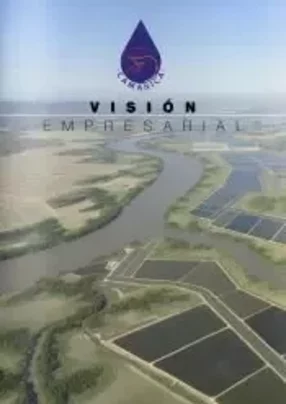Managerial leadership
CAMANICA is one of Latin America's leading companies in shrimp and other species' breeding, farming and marketing. Their CEO, Roberto Ferron, is a Spanish executive whose love for the sea drove him to leave his career as an economist in order to major in Oceanography.
Following his five-year education, specializing in Mariculture, Ferron began a promising tenure with Grupo Pescanova in 1997. He started as an operator for the production area, and in 1999, he was put in charge of mariculture. Soon, he was named diagnostic laboratory manager, remaining in that position until 2001.
By 2006, Ferron had already been appointed as a technical director. That same year, PESCANOVA began working abroad, breeding whiteleg shrimp and other seafood products with salmon-breeding affiliates in Portugal and tilapia fishers in Brazil, among others. But it was not until 2007 that PESCANOVA scouted Central America in order to achieve strategic expansion into countries such as Ecuador, Guatemala, Nicaragua and Honduras. Further research resulted in the acquisition of CAMANICA that same year, where Ferron first joined as a laboratory manager in intensive farming before becoming the head of the front office by 2012.
"My father was an economist too, but I walked away from all that due to my love for the sea; since mariculture is involved with the essential proteins from animal origin, without which we would not be able to do anything at all. In this life, doctors are necessary, lawyers are necessary, but the work derived from mariculture is necessary up to three times a day: breakfast, lunch and dinner," says Ferron.
New management
Due to the company's growth during recent years, the management has focused on sustaining progress through expansion and increasing productivity for every single activity performed by CAMANICA, including collaborations with other companies from the PESCANOVA corporation in other locations worldwide and continuous improvement breeding shrimp for export to Mexico, the U.S. and Europe.
Additionally, CAMANICA has paved the way in disease-free breeding, they have successfully developed breeds in different feeding phases, and their plant has been upgraded with the latest technology.
"We have always tried to perform at our best to contribute to the company's local breeding operation, based in our work with other species abroad," says Ferron.
Global differentiation
Even though Central America's natural conditions provide only two growing cycles a year, CAMANICA supplies large volumes year-round due to a 100 percent vertical structure, controlling every single stage in the process from inception to distribution. The company is always in compliance with food quality requirements and standards.
"Product quality and compliance with health standards are our best marketing resources; these are the most important factors in the markets we supply. We are certified and consumers can make sure that every single aspect surrounding our product finds itself in compliance with regulations and standards," says Ferron.
Exports and expansion
CAMANICA's consistency has turned into a 15 percent growth during the last three years. The goal for 2015 is producing more than 1,000 tons and consolidating related investments for the next five years.
As one of Latin America's largest laboratories with certified production quality, conditions are proper now for third-party sale of shrimp larvae, guaranteeing food security.
Their breeding and processing plant is focused in preserving the previously achieved production levels of packaging more than 140 tons per day, with a growth forecast of up to 180 tons. As for larvae production, the goal is to produce more than 11,000 tons of finished products by the end of the year.
Sustainable development
Among the sustainability projects developed by the company, are permanent energy saving programs and a solar panel system for the laboratory's water supply during December and January. These projects benefit soil conservation, increase water quality and help the preservation of a green environment and surroundings.
Remaining consistent with the labor's immediate environment, the company manages intermediate breeding as part of sustainability and socially responsible programs.
"There is intensive breeding and non-intensive breeding; we have an intermediate process able to enhance our soil's productivity. During the last year, we have experienced better water quality," says Ferron.
Key suppliers
Without key providers' supplies, CAMANICA's aquafarming production quality wouldn't be possible. Some of the fully met needs in this area include hi-tech equipment, raw material and other supplies enabling the company to meet the demand of consumers worldwide. Imports from Norway, Iceland and the United States are key factors in their supply chain.
"A local hardware provider is as key a supplier, as well as big logistics and transportation companies. Every supplier's role is important at the end of the day, constant improvement is always required because proteins from vegetables, animals and prices vary and we must rearrange our routines on the go when such changes happen," says Ferron.
The future
Aquaculture has become a feasible alternative for animal protein production. And it turns out this activity was an important factor in Nicaragua's economic growth during the last 10 years.
CAMANICA plans to keep growing based on their 15 percent annual increase in production for the next five years, along with sustainable improvements and preserving quality standards as a commitment to their country, environment and foreign market.
"We are one of our trade's model companies in Latin America, and obviously we want to keep at that same level," says Ferron.
Related articles:
- MaxAgro
- PRONicaragua
- CANIRAC
- Ingenio Monte Rosa

